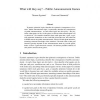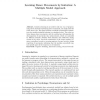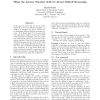1012 search results - page 23 / 203 » What Robots Can Do |
SYNTHESE
2011
13 years 2 months ago
2011
Dynamic epistemic logics describe the epistemic consequences of actions. Public announcement logic, in particular, describe the consequences of public announcements. As such, thes...
KI
2008
Springer
13 years 7 months ago
2008
Springer
Abstract. Imitation learning is an intuitive and easy way of programming robots. Instead of specifying motor commands, you simply show the robot what to do. This paper presents a m...
KR
1989
Springer
13 years 11 months ago
1989
Springer
In this paper I argue that we do not understand the process of default reasoning. A number of examples are given which serve to distinguish di erent default reasoning systems. It ...
IJSE
2010
13 years 4 months ago
2010
Affective computing has proven to be a viable field of research comprised of a large number of multidisciplinary researchers resulting in work that is widely published. The majori...
ENVSOFT
2006
13 years 7 months ago
2006
Our ability to numerically model natural systems has progressed enormously over the last 10e20 years. During the last decade computational power has increased to the stage where w...



